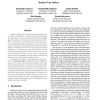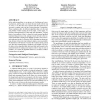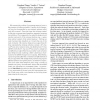412 search results - page 1 / 83 » Ranked Join Indices |
ICDE
2003
IEEE
14 years 5 months ago
2003
IEEE
A plethora of data sources contain data entities that could be ordered according to a variety of attributes associated with the entities. Such orderings result effectively in a ra...
NGITS
1997
Springer
13 years 8 months ago
1997
Springer
We propose a new algorithm, called Stripe-join, for performing a join given a join index. Stripe-join is inspired by an algorithm called \Jive-join" developed by Li and Ross....
PODS
2008
ACM
14 years 4 months ago
2008
ACM
In the rank join problem, we are given a set of relations and a scoring function, and the goal is to return the join results with the top K scores. It is often the case in practic...
ICDE
2002
IEEE
14 years 5 months ago
2002
IEEE
We examine the problem of processing temporal joins in the presence of indexing schemes. Previous work on temporal joins has concentrated on non-indexed relations which were fully...
SAC
2006
ACM
13 years 10 months ago
2006
ACM
Traditional semantic web query languages support a logicbased access to the semantic web. They offer a retrieval (or reasoning) of data based on facts. On the traditional web and...



